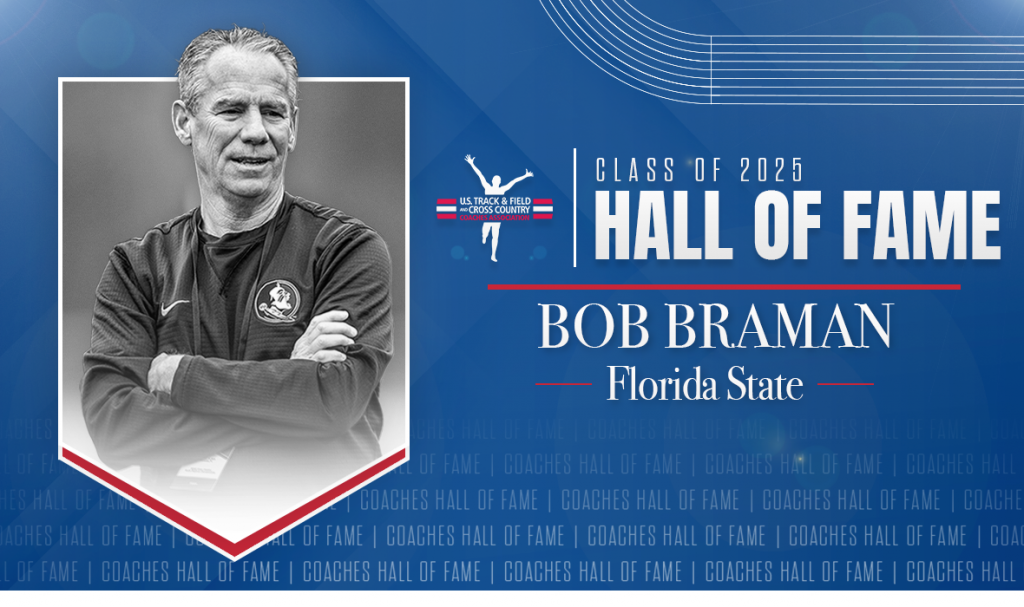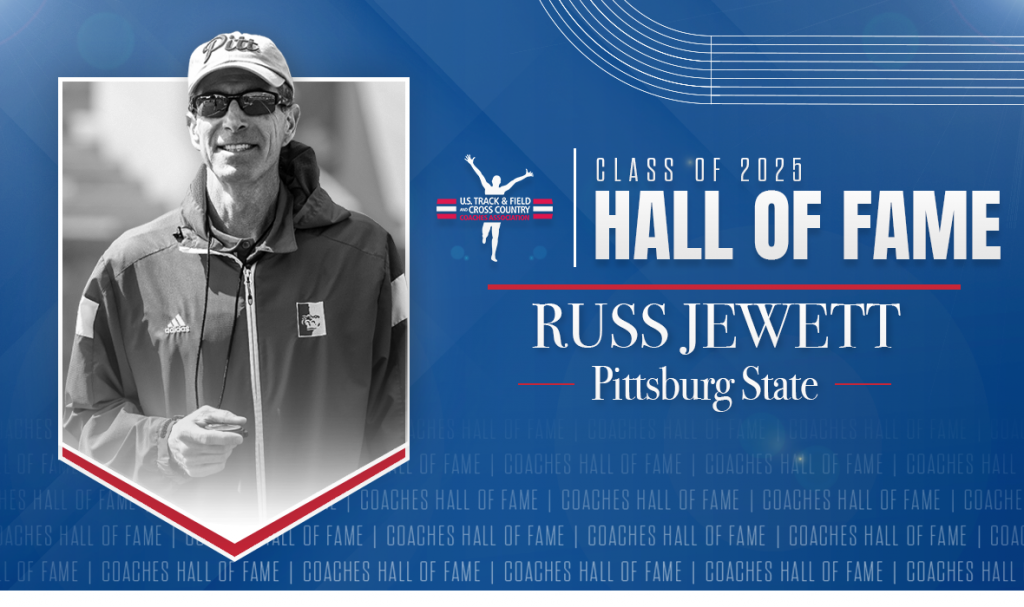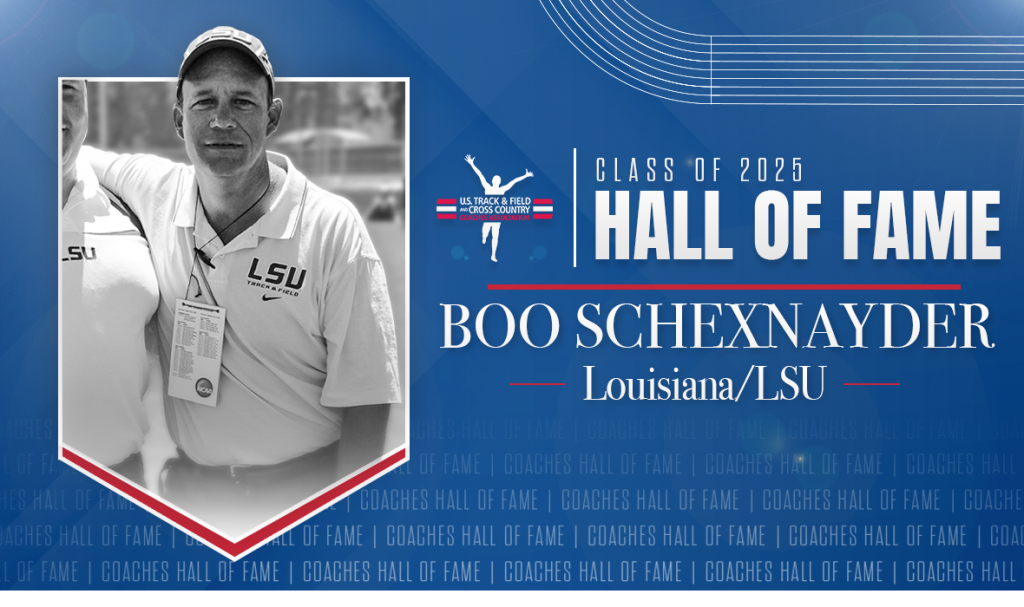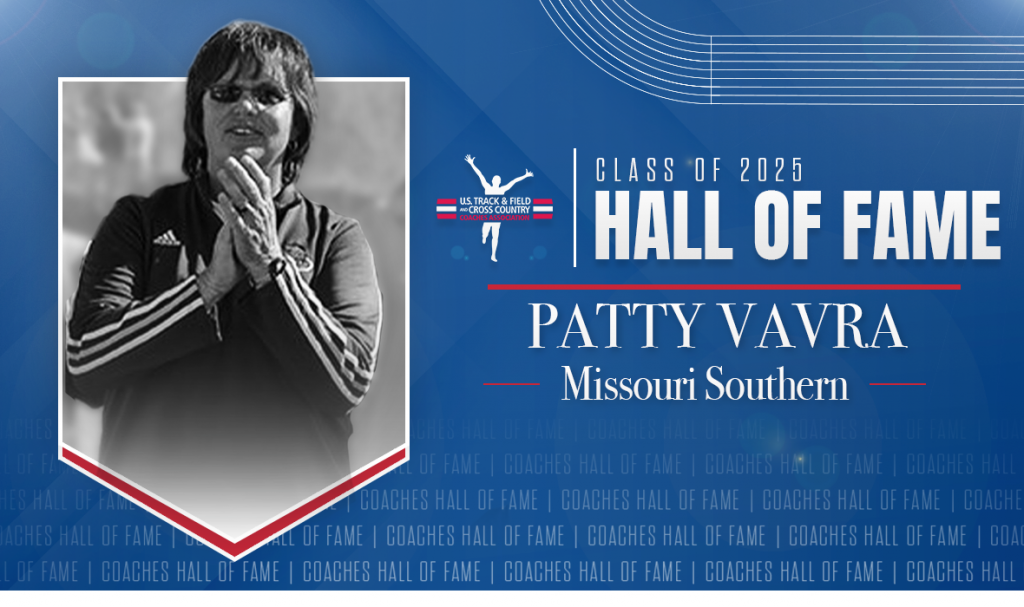

USTFCCCA Coaches Hall of Fame Class of 2025 Announced
NEW ORLEANS – The U.S. Track & Field and Cross Country Coaches Association (USTFCCCA) is privileged to announce the six coaches who will be inducted into the USTFCCCA Coaches Hall of Fame as part of the Class of 2025.
Bob Braman, Brian Diemer, James Henry, Russ Jewett, Irving “Boo” Schexnayder, and Patty Vavra will all be enshrined in the USTFCCCA Coaches Hall of Fame, for not only their historic and incredible accomplishments as cross country and/or track & field coaches, but also the long-lasting impact their contributions have had – and will continue to have – on the sports they coached.
QUICK LINK: USTFCCCA Coaches Hall of Fame History
These six coaches will be honored at the 2025 USTFCCCA Coaches Hall of Fame Induction Ceremony on Tuesday, December 16, at the USTFCCCA Convention, held at the Gaylord Texan Resort & Convention Center in Grapevine, Texas.
Started in 1995, the USTFCCCA Coaches Hall of Fame exists to recognize coaches who have brought great distinction to themselves, to their institutions and to the sports of cross country and track & field. Each of the honorees exemplifies the qualities of dedication to the sport, leadership and passion for their profession and serves as an inspiration to coaches everywhere.
Keep reading to learn more about the Class of 2025.
Bob Braman

Bob Braman retired in 2024. He “unretired” a year later but his career is already Hall of Fame worthy.
His retirement at the end of the 2024 track & field season was rightfully seen as the culmination of 41 combined coaching years at a pair of programs in his native state of Florida – 24 at Florida State after 17 at South Florida.
But before Braman was even announced in the Class of 2025 for the USTFCCCA Coaches Hall of Fame, he decided to take over at Lenoir-Rhyne as Director of Track & Field and Cross Country.
Braman’s time at Florida State was marked by rare success, placing him among the few coaches to guide a program honored multiple times as the John McDonnell NCAA Division Men’s Program of the Year (2010-11 and 2011-12) and to have multiple athletes win The Bowerman, collegiate track & field highest honor (Ngoni Makusha 2011 and Trey Cunningham 2022).
Under his leadership, the Seminoles twice won men’s team titles at the NCAA DI Outdoor Track & Field Championships (2006, 2008) and finished on the national track & field podium 13 times combining men’s and women’s indoors and outdoors. His track & field teams won the ACC 35 times combining men’s and women’s indoor and outdoor, including sweeping the men’s indoor and outdoor crowns six years (2005-10) and once on the women’s side (2014).
In cross country, Braman led the FSU men’s teams to five South Region team titles and laid the foundation for the women’s program, which he directed from 2000-06 that included the first NCAA appearances in Seminole history (2002, ’03 and ’06). He was instrumental in developing the cross country course at Apalachee Regional Park that opened in 2012 and held the NCAA DI championships in 2021.
His squads were impressive in the classroom as well, with the 2010 men’s cross country and 2011 men’s outdoor track & field teams both being named USTFCCCA National Scholar Teams of the Year. Three of his athletes were named USTFCCCA National Scholar Athletes of the Year – Kim Williams (2009 outdoor women’s field), Colleen Quigley (2015 outdoor women’s track) and Cunningham (2022 indoor men’s track).
Prior to his tenure at Florida State, Braman coached at South Florida in his native Tampa. He began as the men’s cross country assistant in 1983 before being promoted to head coach in 1985 and launching the women’s program in 1986. He also was the Bulls first head coach of men’s and women’s track & field when USF instituted those sports in 1991. He coached the Bulls men’s harriers to their first NCAA DI national berth in 1989, back when the field was limited to 22 teams.
His coaching honors include three consecutive USTFCCCA NCAA Division I men’s outdoor track & field National Coach of the Year awards (2006-08). Across all sports, he has been named NCAA Division I South Region Coach of the Year 18 times and conference Coach of the Year 35 times (27 ACC, 6 Metro, 2 Conference USA). He was inducted into the Track & Field Hall of Fame of Florida in 2009 and the Florida State Athletics Hall of Fame in 2025.
A 1990 graduate of Florida, Braman was a three-year captain for the Gators’ cross country team and earned all-SEC honors in cross country (1979-80) and indoor track and was a program record setter in the indoor 3-mile.
Brian Diemer

Brian Diemer is royalty in the state of Michigan.
From a standout prep career at South Christian High School to winning an NCAA steeplechase title with the Michigan Wolverines to capturing Olympic bronze in the same event to a legendary coaching career at Calvin University, Diemer brought an overwhelming pride to the Mitten State.
Truth be told, Diemer didn’t expect to coach three years, let alone nearly four decades.
“[Former Calvin coach] David Tuuk asked if I’d do the ‘hands-on’ coaching in his final two years until his retirement,” Diemer told Calvin’s website in 2022. “My stint was to be a two-year term with no chance of continuing because I was not faculty or staff at Calvin College. Apparently, some concessions were made, because I will be finishing 36 years of coaching next month.”
If Diemer’s foray into coaching ended in 1988, four years after he placed third in the steeplechase at the Los Angeles Olympic Games, his resume would look quite different: zero NCAA titles, instead of four; one Great Lakes Region championship, instead of 34; one Michigan Intercollegiate Athletic Association (MIAA) team title, instead of a record-setting 42; and a plethora of other accolades on the conference, regional, and national stage.
Most of Diemer’s success at Calvin came with the men’s cross country program, a squad he led from 1986 until his well-deserved retirement in 2022. Between those years, Diemer also added the role of distance coach for the men’s and women’s track & field teams starting in 1987 and head coach of the women’s cross country team beginning in 2006.
It didn’t take long for Diemer’s Knights to charge into unchartered territory.
After finishing a close runner-up to Hope College in 1986, Calvin won its first MIAA cross country crown under Diemer in 1987. The Knights would not lose again with Diemer at the helm. Seriously. Calvin put together a streak of 34 consecutive MIAA titles from 1987 to 2021. Eight of the years saw the Knights scored a perfect 15 points, including six between 2000 and 2010.
The aughts treated Calvin’s squads well on the grass circuit. The Knights didn’t extend that same courtesy to their opponents, though. Calvin’s men won four national titles in seven years and finished runner-up in the other three. The Knights were particularly dominant in 2003 when they steamrolled the competition in Hanover, New Hampshire, en route to an 80-point triumph, which was the third largest margin of victory in meet history to that point. Calvin’s women landed on the podium in each year from 2006 and 2008, highlighted by a runner-up finish in 2008.
The Knights also starred on the oval. Diemer-coached athletes won five NCAA event crowns and racked up multitudes of All-America honors. Patrick McNamara and John Lumkes ruled the steeplechase in 1989 and 1990, respectively, and Calvin remains the only men’s program in NCAA DIII history to win back-to-back steeplechase titles with different athletes.
Diemer was named USTFCCCA National Coach of the Year four times and earned more than five times as many Regional Coach of the Year honors during his illustrious career.
James Henry

James Henry had championship success at Michigan as an athlete, but nothing like in his 42-year career as a Wolverine coach.
After Henry’s retirement in 2022, Michigan under his leadership as Head Coach had the most women’s Big Ten Conference team titles combining indoor and outdoor track & field at 16. That total is 17 including his time as an assistant coach.
Henry earned an historic elevation in 1985 when he was hired as women’s head coach, becoming the first-ever Black head coach of a varsity sport at Michigan. The UM Athletic Director making the call was none other than Don Canham, who would be part of the inaugural Class of 1995 into the USTFCCCA Coaches Hall of Fame.
Henry’s biggest successes at Michigan didn’t happen right away. His women’s track & field program made the first of two major leaps after adding Mike McGuire and Arnett Chisholm to his coaching staff in 1990, developing a strong distance program that helped to bring home their first outdoor Big Ten crown in 1993.
That was followed by a sweep of titles in 1994 that included the 1993 cross country title for the Wolverines’ first Big Ten “Triple Crown” (a feat they repeated in 1997-98).
The Wolverines’ potent distance program won the NCAA DI Indoor distance medley relay in 1994 and repeated in 1998, with anchor Katie McGregor also winning the 3000.
Henry led another improvement by the program for its next major step – onto the national podium, which came outdoors with a third-place team finish at the 2007 NCAA DI Outdoor Championships, an effort led by the 100-meter hurdles title by Tiffany Ofili.
Ofili followed by sweeping the NCAA DI indoor 60 hurdles and outdoor 100 hurdles in 2008 as Michigan again reached the podium, finishing third as a team indoors that year. She has five NCAA individual titles, the most by a Wolverine woman. Her younger sister, Cindy, also won an NCAA title (2016 indoor 60 hurdles), and both are three-time Olympians (with both making the 2016 Olympic 100 hurdles final).
Henry has been named Big Ten Coach of the Year 12 times and Great Lakes Region Coach of the Year four times as his athletes won 219 Big Ten event titles and accumulated 193 All-American awards. Michigan earned 11 USTFCCCA All-Academic Team honors with a total of 111 athletes earning All-Academic awards while he was head coach.
Eleven of Henry’s athletes earned the Big Ten Medal of Honor, an award started in 1915 that is given to one male and one female athlete from each school each year across all sports who has demonstrated excellence on and off the field throughout their collegiate career.
Henry qualified from the NCAA Championships four times as an athlete. The native of New Haven, Michigan, was part of four Big Ten men’s team titles while also becoming the first 25-foot long jumper in program history (PR 7.71m/25-3½ plus 7.87m/25-9¾w). His final Big Ten meet as an athlete might have been his best, winning the long jump to lead a 1-2 finish that spearheaded the Maize and Blue to the 1980 outdoor team title.
Russ Jewett

It was all about the numbers for Russ Jewett.
Whether he was crunching data as a computer science and mathematics major at Pittsburg State University, calculating the mark he needed to improve his All-America decathlon score, or tallying the titles from his legendary coaching career, Jewett had a sharp eye for analytics.
Jewett graduated from Pittsburg State in 1983, and just three years later, he was named head coach of the women’s cross country team. Over the next three years, Jewett added roles as head coach of both the men’s and women’s track & field teams in 1987, and soon after, took over the reins of the men’s cross country squad. By the fall of 1989, Jewett was overseeing the Gorillas’ entire cross country and track & field program.
Pittsburg State began to flourish under Jewett’s direction almost immediately.
Jewett-coached teams went a perfect three-for-three at the NAIA-based Central States Intercollegiate Conference (CSIC) championships in 1988. The Gorillas swept the outdoor track & field titles, and the women’s cross country team topped the podium that fall. Jewett wasn’t yet coaching the men’s cross country team – a feather he’d add to his cap the following year.
In 1989, Pittsburg State moved to NCAA Division II and joined the Mid-America Intercollegiate Athletics Conference (MIAA), and success quickly followed – perhaps even an understatement.
Over the next 32 years, Jewett’s teams captured 50 MIAA titles. Of those, 37 came in track & field, with a nearly even split between the men (18) and women (19). The women’s cross country team added 13 more titles, including three different three-peats.
Athletes under Jewett’s guidance starred on the national stage, amassing 34 NCAA event titles and more than 300 All-America honors in track & field alone. Among his standout protégeés were Christie Allen and Brian Moorman. Allen swept the outdoor 5000 and 10,000 meters in both 1992 and 1993, while Moorman became the first athlete in NCAA DII history to win three consecutive 400-meter hurdle titles, accomplishing the feat from 1997 to 1999.
Eventually it all came together for Jewett and the Gorillas – and in the most dramatic and fitting fashion. In 2016, Pittsburg State’s women won the outdoor national title by just one point over the George Williams-led Saint Augustine’s Falcons. Two years later, the Gorilla men edged out Tiffin by one point to win the indoor national title – on their home track.
Jewett is a three-time National Coach of the Year, a 17-time Regional Coach of the Year, and a record-setting 44-time MIAA Coach of the Year. He also served as chair of the NCAA Track & Field Committee, which oversees all levels of NCAA Track & Field competition from 2005-06.
Irving “Boo” Schexnayder

The coaching successes of Irving “Boo” Schexnayder are seen by many in his athletes’ achievements, but his associates know him also as a leader in coaching education.
As a coach, he guided athletes to 26 NCAA event titles, was part of 13 national team championship staffs at LSU and was named the National Assistant Coach of the Year in 2004.
Schexnayder’s most accomplished athletes include horizontal jumpers Walter Davis and John Moffitt. Davis won a combined seven NCAA DI indoor or outdoor titles in the long and triple jumps along with two World Championships golds in the triple jump (2005 outdoor, 2006 indoor). Moffitt swept the 2004 NCAA DI indoor and outdoor long jump titles and added the silver medal at the 2004 Olympics.
A major coaching highlight came at the 2004 NCAA DI Indoor Championships, when his three male triple jumpers – a group that included long jump champ Moffitt – all PRed as part of the first 1-2-3 sweep of the event in meet history. His athletes across all events combined for 37½ of LSU’s 44½ points to win the men’s team trophy as second place had 38 points.
But to many, Schexnayder’s brilliance resides in his initial profession as an educator, although the subject matter changed from the initial mathematics to sports that thankfully included track & field.
Between two stints totaling 18 years as an assistant at LSU, Schexnayder was instrumental in founding the Track & Field Academy – the educational branch of the U.S. Track & Field and Cross Country Coaches Association – and served as program director from its inception in 2009 to 2017.
He has continued as an Academy instructor in biomechanics, training design and event-specific courses and is among the most popular speakers at the technical symposiums at USTFCCCA’s annual convention.
In 2015, Schexnayder won the prestigious George Dales Award that has been presented annually since 2006 by USTFCCCA to a distinguished individual who, through their efforts, has enhanced the profession of coaching track & field and cross country.
He has served as chair of the Coaching Education committee for USATF along with chairing subcommittees for jumps and biomechanics. In addition to his Level 1, 2 and 3 certifications, he has served on numerous Team USA coaching staffs, including the 2008 Beijing Olympics.
Schexnayder’s day-to-day coaching has been replaced by a growing list of speaking engagements via Schexnayder Athletic Consulting that has stops around the globe. Track & field isn’t the only sport of his focus, being joined by basketball, volleyball, rugby, soccer and football, the latter including various NFL teams.
Prior to coaching at LSU he was on the staff at Blinn (Texas) that swept the 1992 NJCAA indoor and outdoor men’s titles before three years at Louisiana (then Southwestern Louisiana) that included coaching Ndabe Mdhlongwa to the 1995 NCAA DI triple jump title.
A native of Vacherie, Louisiana, Schexnayder was valedictorian at St. James High School before beginning a successful coaching career at his alma mater (winning a state title in 1989) while earning bachelor’s and Master’s degrees (both cum laude) from Nicholls State. The Louisiana Track & Field and Cross Country Coaches Association annually awards a scholarship to a high school athlete in his name.
Patty Vavra

Patty Vavra blazed a trail both to and at Missouri Southern State University.
In 1976, Vavra was the first female to receive an athletic scholarship from the university. She excelled as a two-sport athlete for the Lions in basketball and track & field, earning two All-CSIC honors in basketball, and two each in three different track & field events.She also won a CSIC title in the 100-meter hurdles. As a senior in 1980, Vavra was named Lady Lion of the Year.
Vavra said coaching wasn’t her first career choice, but she began to see it as a possibility after witnessing what her coach, Sallie Beard, accomplished at Missouri Southern. Beard was instrumental in establishing women’s sports at the university and coached multiple teams, most notably basketball and track & field.
Soon after graduating, Vavra accepted her first coaching position at Carthage High School in Carthage, Missouri – less than 20 miles from Missouri Southern’s campus. Over the next 14 years, she coached throughout the athletic department, including as leader of the girls’ track & field program. As of August 2025, seven school records by Vavra’s athletes still stand.
Vavra returned to Missouri Southern in 1994 as the women’s cross country and track & field coach. By that time, the Lions were firmly established in NCAA Division II and the Mid-America Intercollegiate Athletics Association (MIAA), both of which they had joined in 1989.
Missouri Southern won its first of seven MIAA cross country crowns under Vavra’s leadership in 1998 – a year in which the program also claimed the individual title, thanks to Sonia Eudy.
Vavra and the Lions waited six more years before returning to the top of the podium – this time in indoor track & field – and soon ushered in a new era of championship success. Between 2006 and 2010, Missouri Southern captured eight more MIAA titles: four straight in cross country (2006-2009), three consecutive outdoor track & field championships (2008-2010), and one indoor track & field title in 2008. That same year, the Lions achieved the vaunted Triple Crown – winning conference titles in cross country, indoor track & field, and outdoor track & field.
Conference prosperity soon translated on the regional and national stages. Missouri Southern won three consecutive regional cross country titles between 2007 and 2009 and placed third at the NCAA DII Cross Country Championships in the final year of that run. Individually, Vavra’s athletes earned a total of 90 total All-America honors – 80 of them coming in track & field alone.
In 2014, Vavra received the USTFCCCA’s Jimmy Carnes Distinguished Service Award, given to individuals who go above and beyond in their service to the Association and to the sports of cross country and track & field. She held several leadership roles within the Association, including serving on the USTFCCCA Board of Directors, acting as President and Vice President of the NCAA DII Cross Country Executive Committee, and playing an integral role in the selection of past USTFCCCA Coaches Hall of Fame inductees.
